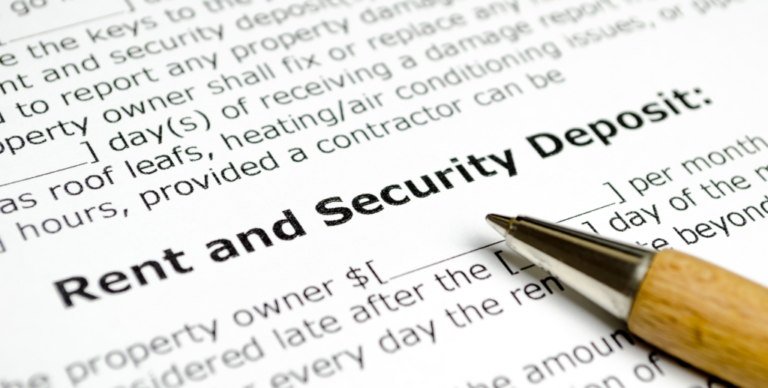Renting properties to tenants is a great way to earn passive income, but you must follow many laws and rules, including collecting security deposits.
Before you begin renting to tenants, it’s important to understand the answer to what is a security deposit and all the factors that go into it.
What Is a Security Deposit?
A security deposit is the money a renter pays a landlord before renting a property, usually upon signing the lease. It’s money the landlord keeps set aside in the event the renter causes damage to the property or breaks the lease prematurely.
Each state has different laws regarding the amount of security deposit landlords can collect and how long they can hold it.
For example, in Arizona, the law states landlords can collect one and a half month’s rent and must return it within 14 days after the lease ends. In California, landlords can charge two months’ rent, and they have 21 calendar days to return the deposit after the tenant leaves the property.
The Role of Security Deposits—Why Require One?
Security deposits protect landlords should the tenants not follow their lease agreement. Again, each state has different laws regarding how you can use a security deposit, but on average, here are reasons to collect one:
Missing rent payments
In most states, landlords can keep a security deposit if the renter misses their rent payment. This provides landlords with at least a month or two worth of insurance, should the renter not make their payments.
Missing utility payments
If you charge renters utilities and they don’t pay them, the security deposit can cover the cost. Utilities may include things like gas, electricity, water, or garbage removal.
Excessive cleaning bills
If the tenant leaves the property in poor condition, you may keep some or all of the security deposit to cover the cost of the services to properly clean it.
This doesn’t cover the ordinary costs to clean a property when turning it over; instead, it means if there is excessive garbage, dirt, or special services required to make the home livable.
Property damage
If tenants cause damage to the property beyond normal wear and tear, landlords can often keep the security deposit. Common issues include holes in walls, damaged flooring, and broken appliances or windows.
Broken lease
Landlords can usually keep the security deposit if a tenant breaks a lease, meaning they leave the property before the lease ends. The exact terms depend on the phrasing in the lease agreement.
How Much Should Landlords Charge?
Landlords can use their own discretion regarding how much to charge for a security deposit, up to the mandated limit in their area. For example, if you live in Connecticut, where two months’ rent is allowed, it’s wise to collect that much.
If your state doesn’t have a maximum amount allowed, like Colorado, consider what other landlords in the area collect so you can stay competitive.
The key is to charge a high-enough security deposit so that you don’t lose money should the tenant violate the lease either by not paying rent, leaving early, or damaging the property.
Collecting and Returning Security Deposits
Collecting security deposits as guaranteed funds, such as a cashier’s check, is best. Avoid collecting security deposits as a personal check, which includes the first month’s rent. If the check bounces, you are out the security deposit and the first month’s rent.
Requiring guaranteed funds protects your investment in the tenant.
Each state has laws regarding how you must collect the security deposit and where you can keep it. Many states require that the funds go into a separate interest-bearing account.
Landlords must follow the law regarding when to return security deposits and under what circumstances they can keep any part of it. Most states have a short window when the deposit must be returned by law.
When collecting security deposits, the landlord and tenant should walk through the property together, taking pictures and documenting any preexisting issues to avoid being charged for them when they leave the property.
Landlords should use the same process when the tenant vacates the property. In some states, the tenant is allowed to be present during this walkthrough, and the property’s condition should be compared to the initial walkthrough.
Related: 5 Tips for Collecting Security Deposits Smart Landlords Swear By
Holding Security Deposits (Escrow Account Laws)
Landlords are required to hold security deposits in an escrow account. This account must be separate from the landlord’s funds, including any rent collected.
If your state doesn’t require the funds to be in an escrow account, at a minimum, they require you to keep the funds in a regulated financial institution, usually in an interest-bearing account.
Final Thoughts
Security deposits are like insurance for landlords. Protecting your investment when you entrust your property to tenants is essential. It can cover things like unpaid rent, property damage, or unpaid bills.
Knowing your state’s security deposit laws is important to ensure you don’t violate any landlord-tenant laws.
Related: 10 Security Deposit Tips, Tricks, & Hacks for Landlords
Find financial freedom through rentals
If you’re considering using rental properties to build wealth, this book is a must-read. With nearly 400 pages of in-depth advice for building wealth through rental properties, The Book on Rental Property Investing imparts the practical and exciting strategies that investors use to build cash flow and wealth.
Note By BiggerPockets: These are opinions written by the author and do not necessarily represent the opinions of BiggerPockets.





